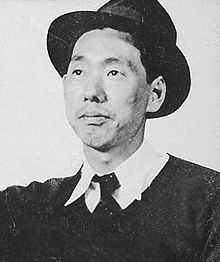
Back ميكيو ناروسي Arabic ميكيو ناروسى ARZ Mikio Naruse Azerbaijani Mikio Naruse Catalan Naruse Mikio German Mikio Naruse Esperanto Mikio Naruse Spanish Mikio Naruse Basque میکیو ناروسه Persian Mikio Naruse French
Mikio Naruse | |
|---|---|
 Naruse in 1933 | |
| Born | 20 August 1905 |
| Died | 2 July 1969 (aged 63) Tokyo, Japan |
| Nationality | Japanese |
| Occupation(s) | Film director, screenwriter, producer |
| Years active | 1930–1967 |
Mikio Naruse (成瀬 巳喜男, Naruse Mikio, 20 August 1905 – 2 July 1969) was a Japanese filmmaker who directed 89 films spanning the period 1930 to 1967.[1][2][3]
Naruse is known for imbuing his films with a bleak and pessimistic outlook. He made primarily shōshimin-eiga ("common people drama") films with female protagonists, portrayed by actresses such as Hideko Takamine, Kinuyo Tanaka, and Setsuko Hara. Because of his focus on family drama and the intersection of traditional and modern Japanese culture, his films have been compared with the works of Yasujirō Ozu.[4] Many of his films in his later career were adaptations of the works of acknowledged Japanese writers. Titled a "major figure of Japan's golden age"[5] and "supremely intelligent dramatist",[6] he remains lesser known than his contemporaries Akira Kurosawa, Kenji Mizoguchi, and Ozu.[7] Among his most noted films are Sound of the Mountain, Late Chrysanthemums, Floating Clouds, Flowing and When A Woman Ascends The Stairs.[1][7][8]
- ^ a b "成瀬 巳喜男". Kotobank (in Japanese). Retrieved 9 October 2022.
- ^ "成瀬巳喜男". Kinenote (in Japanese). Retrieved 9 October 2022.
- ^ "成瀬巳喜男". Japanese Movie Database (in Japanese). Retrieved 9 October 2022.
- ^ Richie, Donald (2005). A Hundred Years of Japanese Film (Revised ed.). Tokyo, New York, London: Kodansha International. ISBN 978-4-7700-2995-9.
- ^ Cite error: The named reference
bfiwas invoked but never defined (see the help page). - ^ Jacoby, Alexander (2008). A Critical Handbook of Japanese Film Directors. Berkeley, California: Stone Bridge Press. pp. 268–273. ISBN 978-1-933330-53-2.
- ^ a b Russell, Catherine (2008). The Cinema of Naruse Mikio: Women and Japanese Modernity. Durham and London: Duke University Press. ISBN 978-0-8223-4290-8.
- ^ Sharp, Jasper (2011). Historical Dictionary of Japanese Cinema. Scarecrow Press.